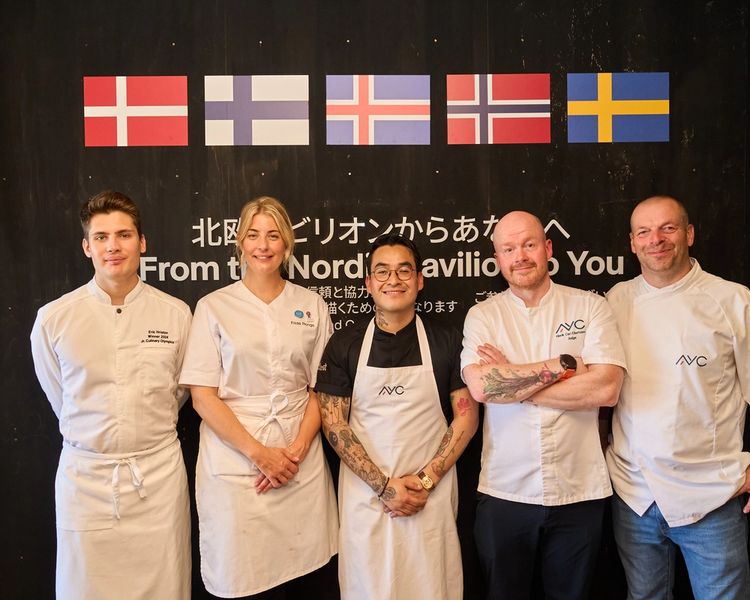Nordic Food Day:Event Report

Nordic Food Day: Exploring the Future of Food Through Nordic Innovation and Culture
On Tuesday, September 2, a special program titled Nordic Food Day was held, spotlighting the food and culinary culture of the Nordic region. The event featured a vibrant mix of business showcases, cultural exchange, and discussions on sustainability, drawing strong interest from industry experts, government representatives, and the public.
Nordic Food Fair: Over 30 Leading Companies Gather in Osaka
The day began at the Grand Prince Hotel Osaka Bay with the Nordic Food Fair, where more than 30 food-related companies from the five Nordic countries, as well as Greenland and the Faroe Islands, presented their latest products and innovations.
From Sweden, Orkla Snacks showcased its popular vegan candy brand Bubs, alongside premium sweets from Dream of Sweden, noted for their elegant gift packaging. The Swedish Food Federation highlighted sustainable farming models and the global competitiveness of Sweden’s food industry.
Finland was represented by Valio and Fazer, with a focus on antibiotic-free dairy production, world-class food safety, and high-quality confectionery. Apetit introduced its range of frozen vegetables, while Nordic Oats and Kinnusen Mylly/65 Oats presented plant-based proteins and Arctic superfoods.
Denmark brought together leaders in food biosolutions, including Novonesis, and spotlighted the internationally renowned food-waste reduction app Too Good To Go. Royal Greenland (Greenland) and Varðin (Faroe Islands) showcased premium North Atlantic seafood.
Norway celebrated 40 years of salmon sushi in Japan, with leading producers such as MOWI, SalMar, and Lerøy emphasizing their sustainable aquaculture practices. Attendees enjoyed salmon tastings, underscoring the close culinary ties between Japan and Norway. Norwegian company NoMy also presented innovations in mycoprotein development, linking Japanese fermentation culture with Nordic foodtech.
From Iceland, Icelandic Seafood highlighted its renewable-energy-based clean food production and diverse seafood portfolio, from caviar to redfish. Visitors praised the quality and freshness of seafood sourced from the island nation’s pristine waters.
Lunch Session: Experiencing Nordic Cuisine Firsthand
The program continued with a lunch session at the Nordic Pavilion, where participants could taste Nordic culinary innovation.
Sirið Stenberg, Minister of Foreign Affairs, Industry, and Trade of the Faroe Islands, delivered opening remarks. He praised Japan’s high standards in food quality and detailed the Faroese tradition of natural fermentation (ræst), while also reflecting on the New Nordic Food Manifesto, launched 20 years ago, as a driver of global change.
Deputy Secretary General of the Nordic Council of Ministers, Ida Heimann Larsen, reaffirmed the Nordic Prime Ministers’ joint vision of becoming “the most sustainable and integrated region in the world by 2030.” She also highlighted initiatives like Arctic Young Chef, which nurtures new talent while promoting the use of underutilized resources.
The lunch was curated by Executive Chef Sebastian Jimenez Garcia of Ræst (Faroe Islands), who made his debut in Japan. Recognized as Young Chef of the Year 2023 by White Guide Denmark, Garcia blends traditional Faroese fermentation with modern sensibilities, drawing on both Nordic and Mexican culinary traditions. He emphasized the role of Arctic food culture in offering lessons on sustainability:
“Fermentation and preservation have been passed down long before the word ‘sustainability’ was coined. They hold vital lessons for today’s global challenges,” he said, also noting the inspiration he draws from Japan’s fermentation culture and its spirit of using ingredients without waste.
Famous Swedish chef Frida Ronge and Eric Hristov, head chef of the Nordic Pavilion restaurant, also contributed to the meal, creating a culinary dialogue between Nordic traditions and Japanese refinement.
Press Conference: Shared Values, Shared Future
The afternoon press conference opened with remarks from Finn Kristian Aamodt, Commissioner General of Norway, who highlighted the shared values of Japan and the Nordics: respect for nature, appreciation of the seasons, and simple yet profound flavors. He drew parallels between Nordic fermentation practices and Japanese pickling traditions, resonating with the audience.
Representatives from all five Nordic countries then outlined their respective food strategies:
- Sweden emphasized innovation in plant-based proteins, oats, and premium confectionery, highlighting four guiding principles—future-focused, caring, trustworthy, and globally oriented.
- Finland showcased clean agriculture, with reduced use of antibiotics and pesticides, and announced the Japan rollout of the Nordic Oats project.
- Denmark presented advances in sustainable seafood, biosolutions, and food-waste reduction, underscored by strong support from Greenland and the Faroe Islands.
- Norway shared developments in sustainable seafood and emerging food technologies, marking both the 120th anniversary of diplomatic ties with Japan and 40 years of salmon sushi in the country.
- Iceland introduced renewable energy-driven food production and zero-waste seafood practices, presenting skyr and other traditions as globally relevant health foods.
Closing remarks came from Stine Grumman, Commissioner General for Denmark, who described food as “a universal language that connects people and builds trust.” She stressed that the day’s conversations marked “not the end, but the beginning” of future cooperation.
Business Seminar: Toward a Sustainable Food Future
The day concluded with a seminar that examined the intersection of sustainability, innovation, and lifestyle:
- Session 1: Recipes for Nordic Happiness in Japan explored why brands like Norway’s Fuglen café and Swedish confectionery have resonated in Japan, framing Nordic food as a lifestyle rather than just a product.
- Session 2: Clean Food for People and the Planet highlighted Finland’s Fazer and Lantmännen’s work on oats, Valio’s “Clean Milk” philosophy, and Apetit’s high-nutrition vegetables.
- Session 3: Sustainable Seafood featured Royal Greenland and Lerøy discussing strategies for sustainable fishing and global nutrition.
- Session 4: Advanced Foodtech showcased Too Good To Go and Novonesis, emphasizing how technology and cross-sector collaboration can accelerate change.
Building a Shared Vision for the Future
Throughout Nordic Food Day, more than 30 companies, leading chefs, and government representatives came together to demonstrate how Nordic food is about more than taste—it is about sustainability, innovation, and cultural connection.
From seafood and plant-based proteins to fermentation traditions and foodtech solutions, the event highlighted the shared values of Japan and the Nordic region: respect for nature, high quality, and the pursuit of a sustainable society.